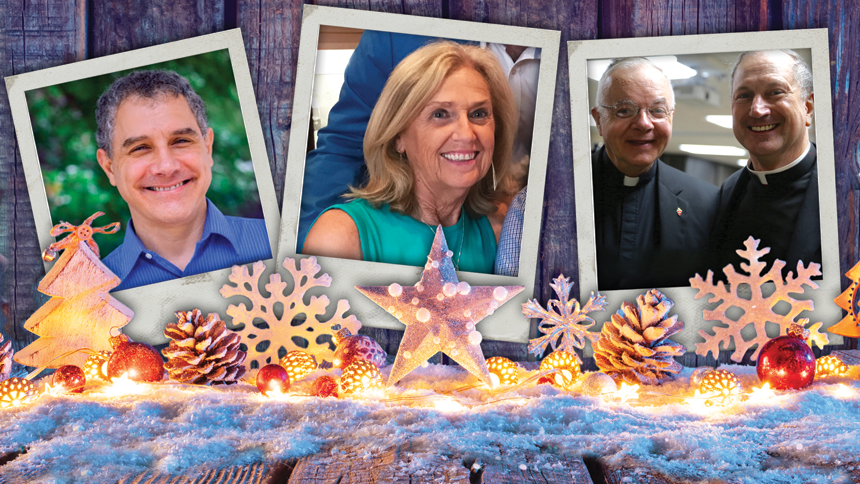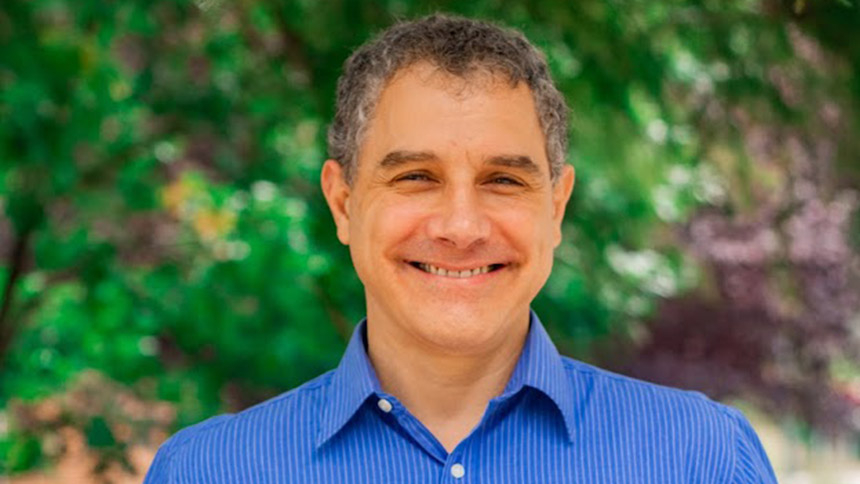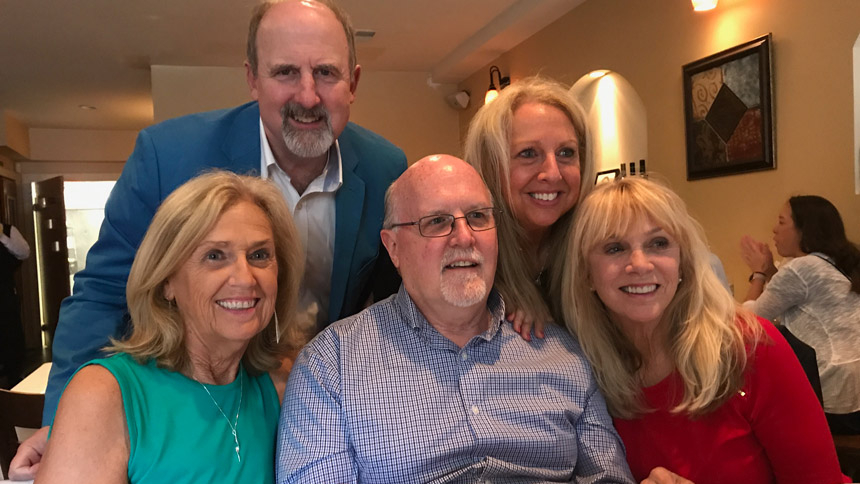
‘Tis the season of joy - awash in the wonder of tinsel and twinkling lights, the quest for the perfect gift, and hope for the happiest of family gatherings. But what exactly is joy? Into every life come times of joy: the birth of a child, a wedding, a moment of peace in a hectic day, the grace of awareness of God’s presence in one’s life. Yet these moments are often hard to grasp, and flee as the reality of life presses in.
True joy—the underlying peace that lasts despite the pressures of life—is often confused with happiness, a more transitory emotion inspired by fleeting events.
“Certain things bring momentary happiness to people, but they tend to pass pretty quickly,” said Monsignor Mike Shugrue. “But joy is abiding and permanent, and something you have to work at.”
Monsignor John Wall defines happiness as a humanitarian virtue. Happy people are often adaptable, energetic and enthusiastic — positive qualities generated by the mind and the environment.
“Joy is different. It’s not of the world as much as it is of God and the [Holy] Spirit,” he said. “It’s a gift from God to give us this deeper sense of contentment which rests on a stronger foundation.”
From a Catholic perspective, Monsignor Wall defines that foundation as an understanding that there are deeper realities to life — the reality that a loving God has created us and placed us here, has endowed us with certain gifts, and has given us a deeper understanding of God in our lives through the Spirit, the Church, our traditions, and the scriptures.
“Happiness is in acquiring, and joy is often in sacrificing,” Monsignor Wall said.
He notes that because people of joy are grounded in these deeper realities, they can approach almost any situation with a sense of balance, hope, acceptance and understanding that God is with them and will support them in this situation and beyond.
Christ, an example of joy
What makes someone a joyful person? Clearly, it’s not the absence of pain, or suffering, or any of the other miseries common to humanity. In general, joyful people seem to retain their joy despite their personal circumstances. They seem deeply centered, with a core of strength that allows them to engage fully with the world in all its laughter and woe, without being shaken or overwhelmed.
Scripture reveals Christ as a person of joy, despite being a refugee, poor, homeless, hungry, tired and pursued at all hours of the day and night by those who sought healing. At the Last Supper, Jesus referred to his own joy, even as he shared his final words of love and teaching with his apostles: “These things I have spoken to you so that my joy may be in you, and that your joy may be made full.” John 15:11
“If joy is an inner peace and knowing what you are about, Christ had that in a deep way, and that is what made him so attractive,” said Monsignor Wall. “He was not just a happy-go-lucky person who walked around and made everybody smile and laugh. He taught profound truths that are eternal to this inner peace and joy that God wishes for us to have.”
Paying attention to the joyful
That’s the thing about joyful people. They capture your attention. They are engaging. You want to be around them. Maybe you even want to be them.
So how can each of us access this joy, particularly in this season that brings us closest to the mystery of God’s love for humanity, manifest in the gift of his son as our guide to eternal life?
Mary Pat Barth, a spiritual director and parishioner at St. Therese in Wrightsville Beach, believes that God’s joy is revealed to us in the everyday, but we must do our part to notice and revel in that grace.
“Joy is the expression of the simple and surprising moments we experience more often than we think,” she said. “They are expressions of God, of the sacred, and only found when we take the moments to reflect. It’s a practice. It’s a discipline.”
She has a daily custom of lighting a candle and taking some time alone every night to reflect back on the day, asking: “Was joy offered to me today? Was it so subtle and simple that I missed it? Where did God meet me in the ordinariness of my life?”
Those reflections lead her to find most of her joy in random ordinary things, like the beauty she finds in the trees, flowers, birds and fragrances of nature on her daily walks in the park. She also finds joy by observing relationships: mothers walking their babies in strollers, dads teaching their kids to ride a bike or people walking their dogs and picnicking.
“All of those expressions bring me joy and draw me closer to the God who offers us those gifts,” Barth said. “I advise people to pay attention to what surrounds them, especially in nature.”
Lucian Lucia agrees that God is manifest all around us. A parishioner at St. Mary Magdalene Parish in Apex and professor of chemistry at North Carolina State University, Lucia believes curiosity is a key to unlocking that relationship with God.
As a child, he read about trilobites—a weird looking crab-like species—and learned that they had a supremely complex visual system, so complex that one scientist said the creature could not have come into being by genetic evolution, but only by intelligent design.
“There is such an incredible elegance to creation. I think as you discover it, you are filled with a profound joy. Finding joy in nature through curiosity is something that can be taught and could give access to joy more readily,” Lucia said.
Retaining joy, even amid pain
But finding, feeling and creating joy is different from retaining it, particularly in times of pain and suffering. It’s a different challenge altogether.
“The advice I’d offer others struggling to find joy in their lives is to be gentle with themselves, patient and trusting that their struggles will gradually heal and they will come out of them with growth and new life,” Barth said.
Lucia also notes the importance of continuing to seek God in our lives despite the challenges of each day.
“Staying joyful really means not giving up. It’s a question of knowing that God is good and that he cares about us,” Lucia said.
For both Barth and for Lucia, daily prayer is vital, especially in difficult times, for God heals the hearts of the brokenhearted. Asking God for the blessings of joy and hope in our prayer is vital, too.
“When we call to God, God hears us and responds in God’s ways,” Barth said. “That has been true for my life, though never in the ways I expected!”
For inspiration, Barth turns to scripture and the mystics. She prays with Jeremiah 29:11 for reassurance that God has a plan for us, full of peace, not disaster.
She also uses Julian of Norwich's famous prayer as a mantra: “All shall be well and all manner of things shall be well.” And she draws strength from Theresa of Avila's prayer: “Let nothing disturb you, Let nothing frighten you, All things are passing away: God never changes. Patience endures all things. Whoever has God lacks nothing; God alone is enough.”
During his lifetime, Monsignor Jerry Sherba, who died Oct. 26 and was a priest of the diocese for 42 years, looked to the saints and their struggles as a source of joy and inspiration.
“It’s always so good to be able to look back at the saints and find words (and lives!) that encourage us to keep on keeping on,” Sherba wrote in his Caring Bridge journal, which he updated throughout his cancer journey. “We’re not the first, and we certainly won’t be the last, to experience struggles in our lives! We just need to be reminded of that once in a while and remember that God is with us every moment of every day!”
Paying attention to the graces God offers in the everyday and trusting in God’s good will for each of us, can lead us to that underlying joy which is the hallmark of truly joyful people. And with that joy comes another essential element — gratitude.
Gratitude was important to Monsignor Sherba, who often expressed his thanks both to God and for those in his life who supported him.
“I found so much comfort in hospital by just saying, “Thank you, Lord!” so many times! Lying in bed, going through a fever bout, getting blood and platelets ... just about every time I could, “Thank you, Lord!” or “Praise you, Lord!” was on my lips! Your love, your prayers, God’s graciousness – I’m here thanks to all!
“Life is beautiful ... a gift – a precious gift – to be enjoyed, to be lived, to be loved every moment of every day! Our God is such a beautiful, awesome, compassionate God! God is here, with us, sometimes holding us up, sometimes just holding our hand ... when we picture that, who can ask for anything more, eh?”
When joy isn’t present
Not everyone experiences joy during the holidays – sometimes it can feel as if you are standing outside happiness and looking in at others who share a secret you do not know. The holidays can exacerbate loneliness and grief if you’ve experienced a loss, or deepen chronic depression. If you or someone you know is experiencing a sense of hopelessness or depression, please contact a medical professional, therapist or the National Suicide Prevention Lifeline at 800-273-8255.



